Recreating history from newspaper quotes
“I go into my Quotebank and all history unrolls before me.”
Thank you for visiting our website! We, the ADAventurers, are happy to present the outcome of our project.
The ADAventurers: Lucas Brunschwig, John Mavrothalassitis, Axelle Piguet, Ester Simkova

Project context
This project was done in the context of the Applied Data Analysis course at EPFL given by professor Robert West. We were provided with the Quotebank dataset, containing newspaper quotes from January 2015 to April 2020.
Research questions
Using this dataset, the research questions we asked ourselves were the following :
-
Are newspapers’ quotes representative of events occurring in the world ? Meaning, can we deduce a time-line of important events that happened in the world during a certain time-frame only from topics emerging from newspaper quotes ?
-
When an important event occurs, does the general sentiment from newspaper quotes regarding the topic evolve ?
Methods
Finding topics from quotes
The Quotebank dataset provides more than 100 millions quotes over 12 years. We decided to focus on the years 2015-2020. For each of these years, we selected a maximum of 100’000 quotes each month. Then, we used the NLP (natural language processing) model BERTopic to extract the topics and associate each quote to a specific topic with a given probability. Using the 30 monthly hottest topics, meaning the ones that have the most quotes associated with them, we looked into the quotes associated with the topic with the most probability. Using this information, we chose for each month the most meaningful topics to be kept. Then, we created a script to visually represent the chosen topics on a time-line for every month and also for every year.
Analysing the sentiment change before and after an event
To answer the second question, and so to perform sentiment analysis, we used a fine-tuning algorithm for BERT, training the BERT sentiment classifier with data from Twitter - using 1700 complaining (negative sentiment) and 1700 non-complaining (positive sentiment) tweets. We then passed our quotes, previously regrouped into topics by BERTopic, into the trained BERT sentiment classifier and observed the evolution in percentage of positive vs negative quotes regarding a certain topic, before and after certain events occurred.
Results
Time-line creation
Topics finding
Two kinds of topics emerged from BERTopic.
- The topics always present in the top topics (education, sports, justice..)
- The topics that come up sporadically, assumed to be linked to an event happening
After manually sorting out the first ones, we chose to focus on the second to find meaningful events to put in our time-lines.
For example, you can see here the plots with the frequency of quotes mentioning terrorism per month in 2015.
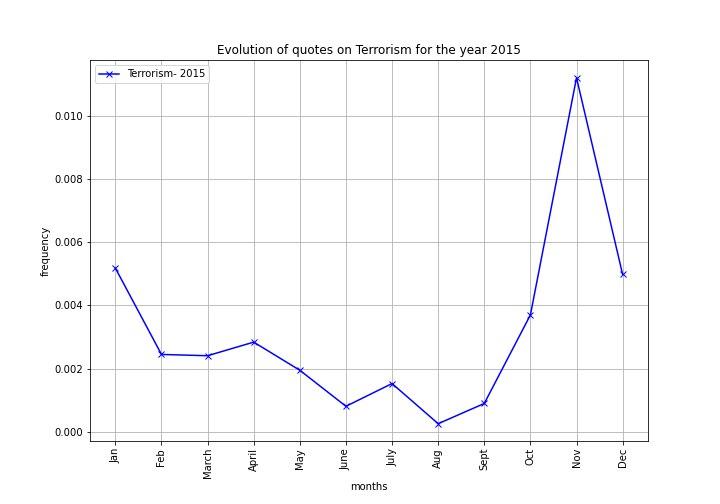
We notice peaks in January and November, linked to the terrorist attacks in France of January 7th (Charlie Hebdo) and November 13th (Bataclan) in Paris.
Another example is the frequency of quotes mentioning Trump per month in 2015 and 2016.
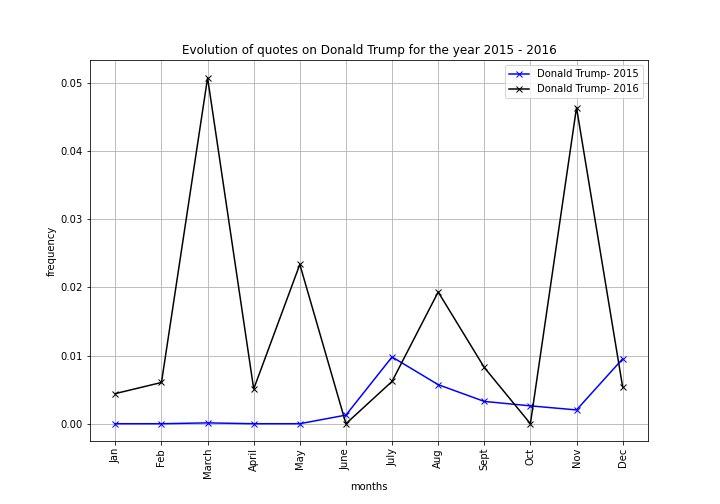
The peak in July 2015 can be explained by Trump announcing his candidacy to the US presidency. Then in 2016, Trump is mentioned a lot more, especially around November 2016 when he was elected president of the US.
A last example we can look at concerns the Brexit:

Here, we can see that Brexit is mentioned quite often in the years 2016-2020, whereas the term doesn’t even appear in 2015. There is also a peak in September 2019 when Brexit was originally supposed to happen.
Searching for proper nouns with NLP (natural language processing) libraries also gives us very interesting plots over time such as here for Nigeria:

We can see a peak in August 2018 when a scandal happened in the country because the Nigerian president did massive corruption.
Searching for other names can also give us very interesting insights about the history of a country/topic.
Timelines obtained
To assess the performance of the time-lines we obtained, we compare the topics we found with the most important events that happened every year according to Usatoday to see if BERTopic caught them.
These are:
- For 2015: July 14, NASA flies by Pluto
- For 2016: November 8, Trump is elected
- For 2017: August-September, Hurricane Triple Whammy (Harvey, Irma, and Maria) devastates the US and the Caribbean
- For 2018: November, wildfires in California
- For 2019: March, Hong Kong protests
- For 2020: March, COVID-19. However, we have to keep in mind that the Quotebank dataset from 2020 spans only the months of January-April.
These topics can be seen to be quite US-centric. However, the newspapers from which the quotes originate in the Quotebank dataset are from Western countries and often the US, so it is quite coherent.
You can see here the time-line we obtain for each year:
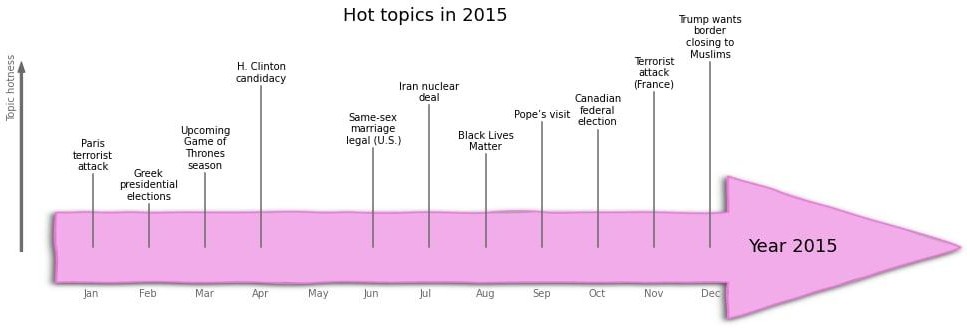
We can see that for 2015, BERTopic didn’t find the NASA flight by Pluto, but it did find relevant topics in 2015 such as the Paris terrorist attacks in January and November, or same-sex marriage that became legal in June 2015 in the US.
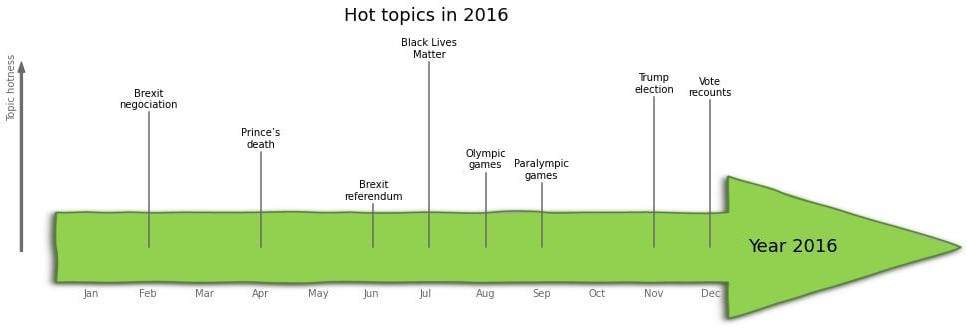
For 2016, the Trump election (as well as the vote recounts) were found by BERTopic to be very hot topics in November and December 2016. However, Black Lives Matter was found to be even more talked about in the newspaper.
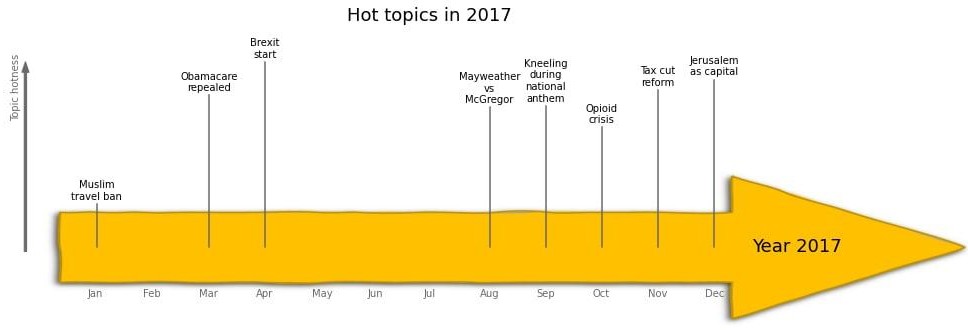
For 2017, the Hurricanes were not found to be that hot topics mentioned in the newspapers. However, some hot topics included Brexit, Obamacare repealed and more about Black Lives Matter (the kneeling during the national anthem).
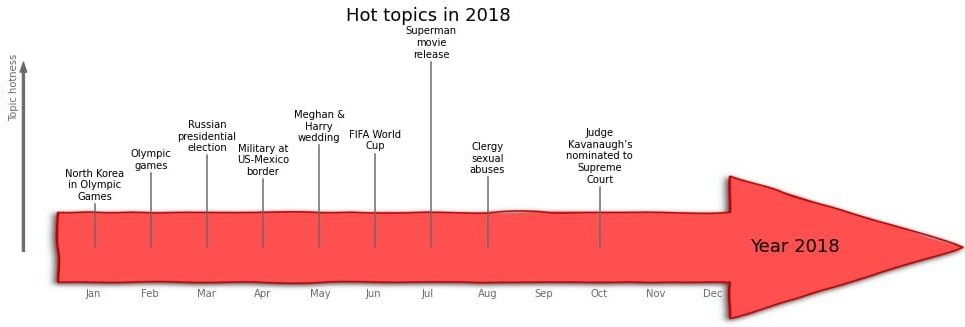
For 2018, California wildfires were not mentioned that often, but other important events emerged such as Meghan and Harry royal wedding, the Russian presidential elections or also the FIFA world cup.

For 2019, the Hong-Kong protests were not found, but some important 2019 events were found such as the Australian bushfires in November 2019 or Trump’s medicare cuts in March 2019.
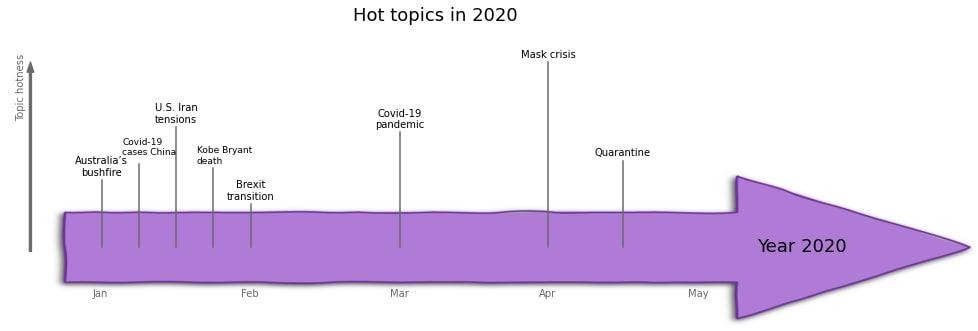
For 2020, BERTopic found many events related to COVID19: the first cases in China, the start of the pandemic, the mask crisis and the quarantine. Some other events were also found such as the Australian bush fires in early 2020.
Sentiment analysis
For the sentiment analysis regarding a particular topic before and after a certain event occurred, looking at the obtained time-line, we chose to focus on two topics:
- Hong-kong protests in March 2019: with which sentiment (positive/negative) China is mentioned in the media before and after the start of the protests. Indeed, the Chinese government expressed their opposition to the protests and took measures against the protests and their supporters.
- The newspapers’ opinion of Trump from 2015 to 2019, especially before and after his election in November 2016.
For the sentiment analysis about China in 2019, we can see the plot obtained, with the y-axis being the percentage of quotes talking about China that are positive depending on the month:
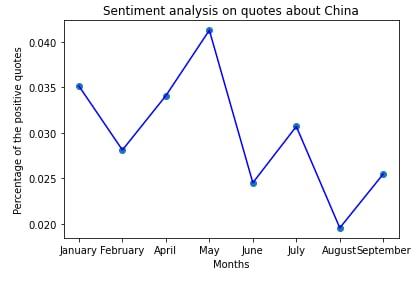
We can see that there is not much change during the Hong Kong protests as the western newspapers, where most of the quotes come from, seem to talk quite negatively about China in general (only 2-4% of quotes are positive).
Regarding the newspapers’ opinion of Donald Trump, we can see a shift according to the events happening around the globe that can be found in our time-lines, even if in general, newspapers talk very little in a positive way about Trump:
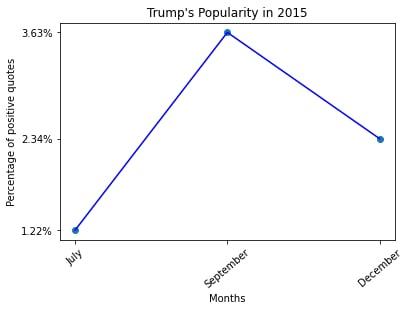
Here for 2015 we see a small peak of popularity in September but nothing very significant.
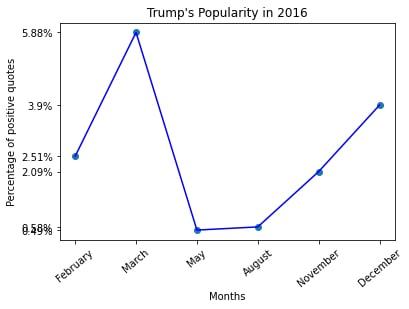
Regarding 2016, there is a drop in Trump’s popularity in May-August, around the same time Black Lives Matter happened, which we can suppose to be correlated. Moreover, there is also an popularity peak in March 2016 which is when the Brussels islamist terrorist attacks happened. We can also speculate a correlation here. When Trump was elected president of the United States in 2016, the newspapers began to talk more positively about him as well.
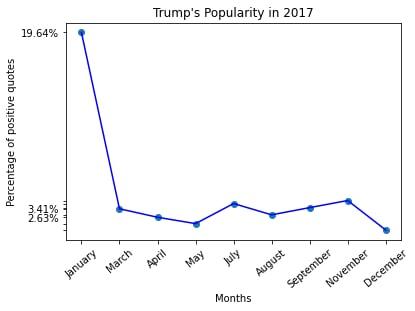
2017 started with a peak in Trump’s popularity since he began his functions as president of the United States January 1st 2017. However then, his popularity dropped drastically and kept decreasing, especially since in March 2017 Obamacare was repealed by him as found in our 2017 timeline above.
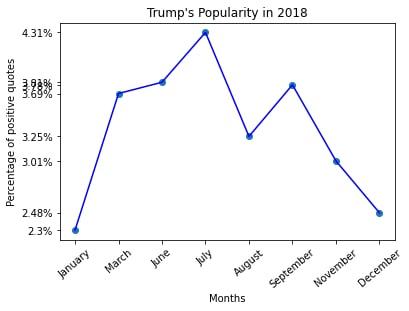
2018 was not a very popular year for Trump and the newspapers talk quite negatively about him throughout the whole year.
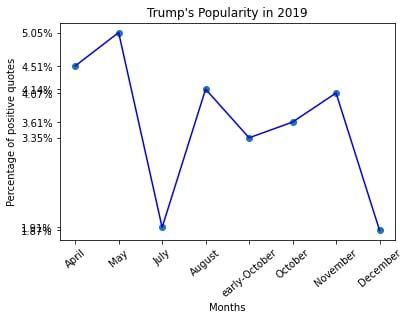
Trump’s popularity continued to decrease in 2019, especially in the last few months. In December 2019, it reached a low when the Congress of the United States made an impeachement against him for abuse of power and obstruction of Congress.
We see that throughout Trump’s term as president he faced harsh criticism for the majority of his actions and the attitude towards him only changed slightly for the better when the U.S. feared terrorism or hostility from other nations. While it shifts for the worse consistently, due to outbreaks of racist events and humanitarian rights movements such as the “black lives” matter movement. Finally his reputation suffered the final blow when he revoked obama care and at 2019 he was disliked vividly by many authors of the quotes, who from late October demanded impeachment.
This harsh criticism of Trump displays that significant events affect the ways certain subjects, such as a politician, are perceived by the population.
Conclusion
To conclude, let’s go back to the two questions we asked ourselves in the beginning:
-
Are newspapers’ quotes representative of events occurring in the world ? Meaning, can we deduce a time-line of important events that happened in the world during a certain time-frame only from topics emerging from newspaper quotes ?
-
When an important event occurs, does the general sentiment from quotes regarding the topic evolve ?
With the data analysis shown above, we can now answer, at least partially, these questions.
First, we showed that it is very complicated to find events occurring in the world only from quotes in newspapers, even using one of the most performant NLP (natural language processing) models available now-a-days: BERT. However, we can still come up with meaningful topics, such as Trump’s election in 2016, Black Lives Matter, Brexit or, very currently, COVID-19.
Then, we can see with sentiment analysis that we can correlate how (positively or negatively) newspapers talk about a topic/someone with the events happening around the globe that we also found in the timelines presented above.
Thank you very much for joining us in this travel through time ! :)
The ADAventurers